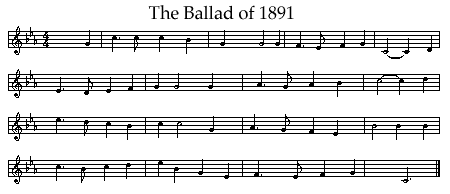
The Ballad Of 1891
Words by Helen Palmer ©1950 Doreen BridgesMusic Doreen Jacobs ©1950 Doreen Bridges
(Sung by Dave Alexander)
- [play]
The price of wool was falling in 1891
The men who owned the acres saw something must be done
"We will break the Shearers' Union, and show we're masters still
And they'll take the terms we give them, or we'll find the ones who will"
From Claremont to Barcaldine, the shearers' camps were full
Ten thousand blades were ready to strip the greasy wool
When through the west like thunder, rang out the Union's call
"The sheds'll be shore Union or they won't be shorn at all"
Oh, Billy Lane was with them, his words were like a flame
The flag of blue above them, they spoke Eureka's name
"Tomorrow," said the squatters, "they'll find it does not pay
We're bringing up free labourers to get the clip away"
"Tomorrow," said the shearers, "they may not be so keen
We can mount three thousand horses, to show them what we mean"
"Then we'll pack the west with troopers, from Bourke to Charters Towers
You can have your fill of speeches but the final strength is ours"
"Be damned to your six-shooters, your troopers and police
The sheep are growing heavy, the burr is in the fleece"
"Then if Nordenfeldt and Gatling won't bring you to your knees
We'll find a law," the squatters said, "that's made for times like these"
To trial at Rockhampton the fourteen men were brought
The judge had got his orders, the squatters owned the court
But for every one that's sentenced, ten thousand won't forget
Where they jail a man for striking, it's a rich man's country yet